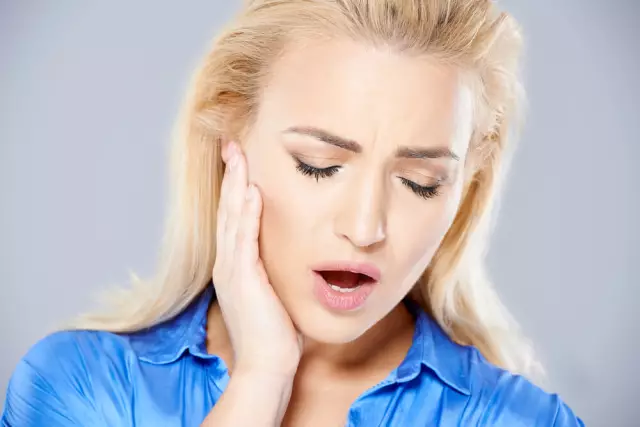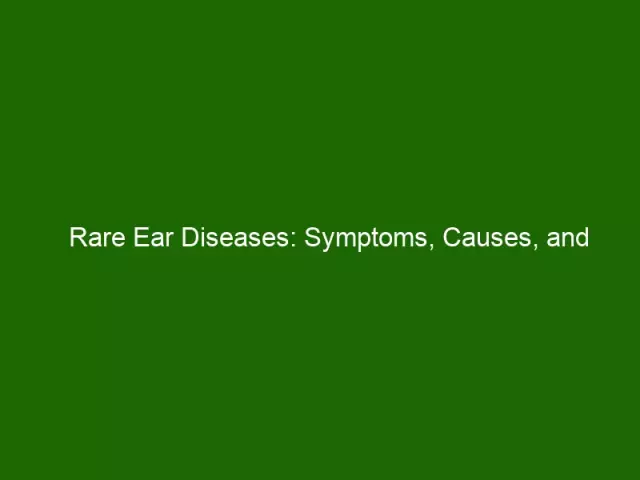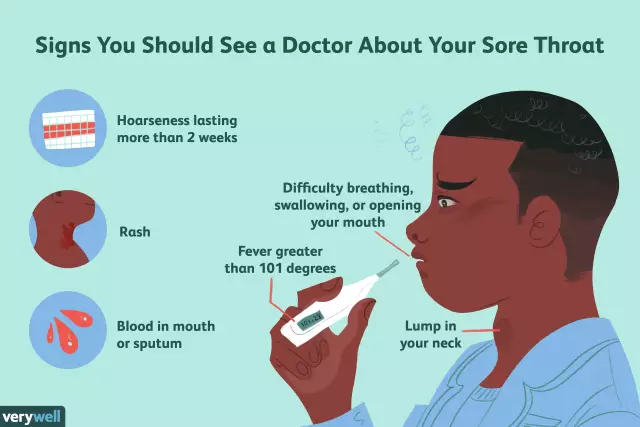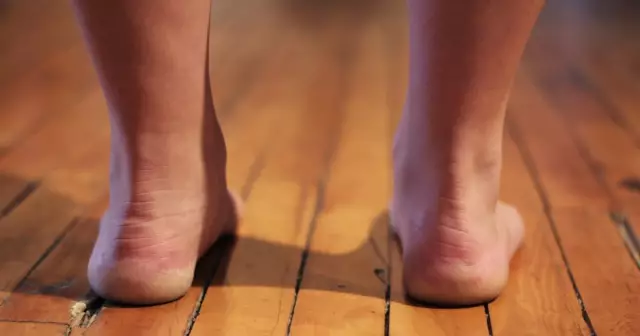- Author Rachel Wainwright wainwright@abchealthonline.com.
- Public 2023-12-15 07:39.
- Last modified 2025-11-02 20:14.
What to do when your ear hurts

In response to the question of what to do when your ear hurts, you can get a lot of a variety of tips. From recommendations to keep the ear warm, to take an abundant warm drink, to instilling propolis tincture or a warm decoction of chamomile into the ear canal. In folk medicine, everything from clove oil to crushed garlic is used. In fact, pain can be of a mechanical, traumatic, infectious nature, or even be a symptom of diseases not associated with ENT organs.
Therefore, before following the advice, you need to contact an otolaryngologist who will determine why the ear hurts and how to treat a specific disease.
Ear hurts - reasons
There are two types of pain - local and radiating. Local is felt directly in the area of the affected organ, that is, in this case, in the ear. Such a pain impulse can occur for the following reasons:
- Pathological processes in the external canal (pimples, mechanical irritation, infection, blockage and inflammation of the hearing organ due to excess sulfur);
- A ruptured eardrum;
- Pathological processes in the inner ear (hypothermia, infectious diseases, pressure difference between the inner and outer ear);
- Shock load on the hearing organ.
Irradiating or reflected - the pain comes from an organ remote from the pathological focus. In this case, when the ear hurts, the cause must be sought in the nearby organs. Irradiating pain impulses can occur for the following reasons:
- Sinusitis;
- Piggy;
- Sinus infection;
- Sore throat, teeth;
- Pathological bite;
- Arthritis of the jaw-temporal joint.
When the ear hurts, both a local and a radiating impulse can be observed. There are a number of the most common disease-causing factors and the appropriate treatments for them.
Ear hurts due to sulfuric plug
Earwax has several functions - it removes foreign particles, traps fungi and bacteria, and creates a moist environment for the eardrum. Sulfur is released little by little during chewing, coughing, talking. But when the process of self-regulation is disturbed, a so-called sulfur plug is formed, due to which the ear hurts. An unpleasant sensation occurs when the congestion reaches the eardrum.
Due to the fact that the plug presses on the vagus nerve, dizziness, headache, vomiting, and coughing are observed. When the congestion thickens, in addition to the ear hurting, the patient feels congestion, hears noise, distortion of his voice and external sounds.
To remove the congestion, methods such as washing with a syringe to Jeanne, an electric suction, and the introduction of drugs that soften and remove the sulfur plug are used. At home, when your ear hurts, ear canal hygiene drops often help to correct the situation. Before choosing them, it is worth consulting with an otolaryngologist.
Ear hurts due to infection
The organ of hearing is conventionally subdivided into the outer, middle and inner ear. Infections of the outer part of the ear canal include otitis externa, which is also called "swimmer's ear", since most often it develops after water ingress. However, in order to bring in an infection, it is enough to unsuccessfully clean the ears with cotton wicks. If the ear hurts and the temperature rises, while a rash is observed on the skin of the external ear canal, this is most likely associated with an infection. In addition, boils located on the outer part of the ear canal can cause discomfort.
A middle ear infection is called otitis media. It is most affected by infants and children under 6 years of age. This is due to the shape of the Eusstachian tube, which is wider and shorter in children than in adults. Because of this, mucus from the nasopharynx often gets into the middle ear cavity in a child, and in infants even food or stomach contents when regurgitating.
If the reason that the ear hurts is otitis media, then the discomfort will intensify when chewing, swallowing and trying to blow your nose, since in these conditions the pressure in the area of the auditory organ increases. Due to this ailment, diarrhea, nausea, vomiting, weakness, lethargy, loss of appetite, noise and ringing in the ears may develop. And, of course, two classic symptoms appear - the ear hurts and the temperature rises. In severe cases, otitis media can cause a ruptured eardrum and deafness.
Inner ear inflammation, or viral labyrinthitis, manifests itself as dizziness and tinnitus. With bacterial inflammation, the ear hurts, and the temperature rises, the head is spinning, the eyes move quickly and involuntarily, and pus may come out of the ear canal.
In the case of external ear inflammation, the patient is prescribed antipyretic and pain relieving medications. Medical help consists in cleansing the ear canal of pus and instilling medications. For infectious pathologies, when the ear hurts, drops should contain antibiotics and cortisone.
For otitis media, pain relievers and anti-inflammatory drugs are also prescribed. But specific treatment includes restoring the patency of the Eustachian tubes. Therefore, when the ear hurts, drops are instilled into the nose - these are drugs to reduce swelling. Antibiotics are also prescribed.
For inner ear inflammation, treatment consists of a course of antibiotics and removal of pus, which sometimes requires surgery.
Eardrum rupture
The eardrum is a thin membrane that separates the outer and middle ear and also transmits air vibrations to the ossicle. Therefore, if the tympanic membrane is damaged, hearing deteriorates.

When the ear hurts due to the injury of the membrane described above, acute pain occurs, purulent, bloody or transparent discharge appears, tinnitus, dizziness and hearing decreases up to its loss. If the ear hurts, how to treat it in this case? As a first aid, it is recommended to close the external ear canal with a lump of sterile cotton wool and apply a bandage. Moreover, if the ear hurts, drops or other drugs cannot be injected into the ear canal. The patient needs to be urgently referred to an ENT doctor; in severe cases, surgical intervention (tympanoplasty) will be required to restore hearing.
Ear pain when swallowing
When discomfort occurs in the ear when swallowing, the ENT doctor first of all suspects acute otitis media. However, if the symptoms do not confirm this, the cause may be hidden in diseases of neighboring organs. For example, pain in the ear when swallowing is a symptom of malignant tumors of the larynx and oral cavity, in this case the discomfort worries for a long time and is accompanied by fatigue, apathy, weight loss, and enlarged lymph nodes.
Ear pain when swallowing can also indicate mumps, especially if the patient has swelling around the ear, fever, and flu-like illness. Also, pain occurs with pharyngitis, tonsillitis and an abscess of the neck region, and are of an irradiating nature.
Self-medication is in any case dangerous, and only an ENT doctor can prescribe the necessary drugs and procedures.
YouTube video related to the article:
Found a mistake in the text? Select it and press Ctrl + Enter.






